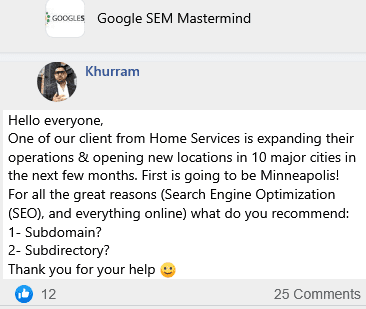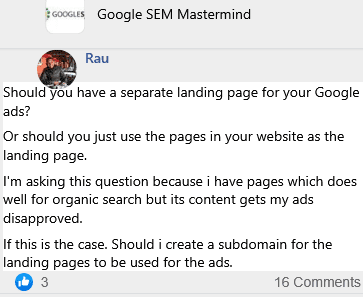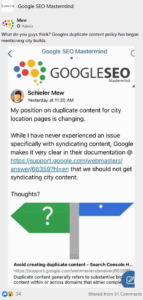The Summary of Discussion 2: Subdomain Versus Subdirectory to Make New Child Websites for Entry Locations in 10 Major Cities
Khurram
Hello everyone,
One of our client from Home Services is expanding their operations & opening new locations in 10 major cities in the next few months. First is going to be Minneapolis!
For all the great reasons (Search Engine Optimization (SEO), and everything online) what do you recommend:
1- Subdomain?
2- Subdirectory?
Thank you for your help 🙂
📰👈
12 👍🏽12 25 💬🗨
I would go with the subdirectory. They will be considered separate entities when they are different subdomains & you will have to work on each and every entity differently.
Much more interlinking opportunities with the subfolder option, IMO. Plus, you can easily display all locations in the navigation bar and place all location pages under the label "Areas We Serve".
If you can direct traffic to these locations from the homepage, customers are likely to be happy with ease of navigation too.
Thank you very much for the detailed response! Very helpful
🤔1
Daniel
Yes use subdirectories do not use a subdomain. You would absolutely be ruining a golden opportunity if you did subdomains. In fact it would be out right wrong. Furthermore this does not sound to me like a public HTML question. This sounds to me like a GMB question because your question implies you're under the assumption that you need to build 10 new websites.
So you have multiple locations you need one website, a properly built geolink map system correlating with the 10 new GMB locations, and that is how you will take advantage. Do you know anything about Google My Business (GMB) SEO? Do you understand what I mean by geolink map system as it relates to all of your GMB locations? If not you should know it because sounds like you've got a great client that is growing in the local service company industry for which this kind of method is gold.
Thank you very much for the detailed response and guidance.
Still in discussion, but we are thinking to create subdirectories for each location. And yes, that includes Google My Business (GMB), local listings management through YEXT, and more.
For tracking purposes, we will use callrail (or similar) dynamic number swap to track all marketing activity from each location page.
Makes it easier for us and the business owner for the reporting purposes.
Daniel » Khurram
I would advise against that. The developing sites for each location thing. It in many ways would be a bad move in my professional opinion. Number one you are increasing your workload tremendously for no reason. Number two you would be losing direct brand equity or online authority if you create a website for each location because you'll have to have a different domain name. Thirdly you will therefore miss out on focusing all of that authority on one website and growing its authority through the roof compared to having 10 websites. Then because of your authority you create 10 different GMB profiles for each location. Call rail is a beautiful idea because you can then use 10 different phone numbers on each GMB profile. In conclusion you end up with one site that has massive authority and 10 different GMB locations which drives home the proximity Factor in that area that you're wanting to appear in the top 3 LP Search Engine Result Page (SERP). That'll be $300 thank you very much. Lol kidding but no honestly I definitely mean everything I said other than that.
Khurram ✍️ » Daniel
TBH: These 10 pages (actually 40 by March 2022) will need to be structured in a way so they start getting organic traffic soon!
Have you done similar work? Would you use the same page/link for paid ads traffic from Google/Facebook ads?
Daniel » Khurram
Your Pay-Per-Click (PPC) work should always mirror your SEO work. Well it doesn't have to 100%, but it's always a good idea to do so yes. Just like for your geolink map system on your website that you'll build with geolocation pages you will create geolocation ads that only appear to people in the city that matches the landing page they're going to see. And yes I have done a lot of this work.
This is very important because City specific pages tend to rank number one very easily but it's an organic position because extension pages do not pop in the local pack. 8 9 10 years ago organic position number one used to be the s***. Not so much anymore and so it's great to pump PPC traffic at those pages so that they become gateway pages for a lot of relevant traffic but then sets off a lot of ux factors.
📰👈
Does the top keyword matching a domain name help its ranking? PMD EMD
Based My One Time Testing: 3 Expired Domains as a PBN didn’t Give Positive Effect to My Money Site
A GMB Case Study How to Structure Location and Service Pages GMB URL and Keyword Density Optimation
The Summary of Discussion 1: Where Should a Landing Page Lie, Main Website, Subdomain or Subdirectory, or web2.0?
Rau
Should you have a separate landing page for your Google ads?
Or should you just use the pages in your website as the landing page.
I'm asking this question because i have pages which does well for organic search but its content gets my ads disapproved.
If this is the case. Should i create a subdomain for the landing pages to be used for the ads.
📰👈
3 👍🏽3 16 💬🗨
Separate landing pages. Always. Whether it is on a subdomain or not doesn't matter. A subdomain would likely be more work.
Separate landing pages let you make much more targeted ad groups and make it easier to get higher quality scores.
Plus I like to make my landing pages so that they have no exit. They either fill out the lead form, call us, or leave.
💟👍🏽8
Cesar
Separate landing pages. I recently cleaned up the ads for a customer that was sending the user to their store main page. From the user point of view it was like clicking on an ad and then arriving at Walmart to start browsing again. Too confusing. A landing page with similar keywords as the ad will help a lot to provide a consistent story from the search box in Google to the contact form/purchase on your website.
Rau ✍️
Thank you everyone 😊 So is it a good idea to use a different domain which sounds alike for the landing pages and track the link to the original website.
L.E. McArthur
Separate page is likely best, but my advice is to always TEST.
For a decade I ran my ads to optimized landing pages with join form, optimized for conversions. But about 4 years ago I switched to sending the ads to posts on my blogs. These posts are not your classic landing page – they are blog articles that review a few options and leave it to the user to click through to the join form on a different site. Sort of like a how to article that recommends the offers.
I was amazed. Adding this extra step increased my conversions and lowered my costs. Even with many ways for the user to leave the page and go elsewhere on the site.
Google much preferred the blog article landers too, perhaps because it had more content. Regardless, the users like it better too and that's what matters. I believe the extra step before the offer fosters a sense of trust in my case. My authority site's recommendation gives them assurance.
So… test for yourself. Always.
Very interesting. I think you're right about assurance. It may also be that they felt the power to choose was in their hands and they didn't feel coerced. Love your story.
Carlos » L.E. McArthur
Yup.
Kathy
You're getting lots of recommendations to create separate landing pages, but my answer is, it really depends. I have a client who sells skincare products that have cannabidiol (CBD) in them, and because CBD was a product category, the term CBD showed up in the menu. That means that every page on the site would have CBD in it. Google didn't like that.
So my first plan was to put the landing page on a subdomain, but giving the generic transactional keywords and buying behavior that goes with those keywords that I was going after, I felt it best to keep them on the store side, even though my lander had an easy way back to the store. In other words, her home page really was the best lander. So I had her recategorize her products so that her site structure would never get in the way, not with this ad campaign or any in the future. And it's working great. The conversion rate is quite high.
Back to your situation, if you have a page working well in search and the "offending" words are important for your ranking, then, by all means, you can create a dedicated lander, and you should. Don't sacrifice free traffic for paid.
Do you need one without a menu to keep them focused on your Call-To-Action (CTA) only? That really depends too. What are you trying to get them to buy? If everything they need to be convinced to buy whatever it is you're selling can be contained on one page, then by all means, isolate them. You do run the risk of losing sales if you don't provide enough information and no easy way to get more, though. Your sales message needs to be on point. So be careful. This approach can backfire on you.
Jason
Disclaim the crap out of every page.
📰👈
When to Use either a Page or a Post for the Website?
Advice for Finding and Hiring an Ace SEO Expert in Ecommerce
Create Ten Articles to Support the Main Article!









